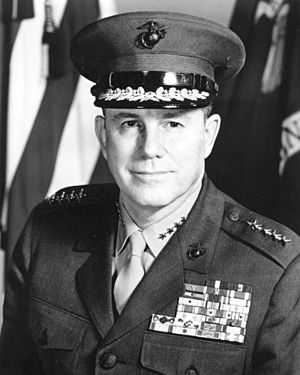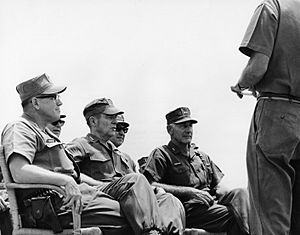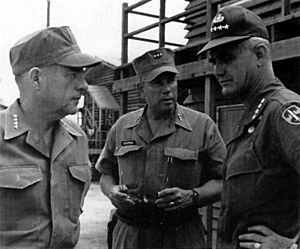Robert E. Cushman Jr. facts for kids
Quick facts for kids
Robert E. Cushman Jr.
|
|
|---|---|

General Robert E. Cushman Jr.
|
|
| Deputy Director of Central Intelligence | |
| In office May 7, 1969 – December 31, 1971 |
|
| President | Richard Nixon |
| Director | Richard Helms |
| Preceded by | Rufus Taylor |
| Succeeded by | Vernon A. Walters |
| Personal details | |
| Born | December 24, 1914 St. Paul, Minnesota, U.S. |
| Died | January 2, 1985 (aged 70) Fort Washington, Maryland, U.S. |
| Resting place | Arlington National Cemetery |
| Military service | |
| Allegiance | United States of America |
| Branch/service | |
| Years of service | 1935–1975 |
| Rank | |
| Commands | Commandant of the Marine Corps III Marine Amphibious Force 5th Marine Division 4th Marine Division Marine Corps Base Camp Pendleton 3rd Marine Division 2nd Marine Regiment 2nd Battalion, 9th Marines |
| Battles/wars | World War II Vietnam War |
Robert Everton Cushman Jr. (December 24, 1914 – January 2, 1985) was a highly respected United States Marine Corps general. He reached the highest rank in the Marines, serving as the 25th Commandant of the Marine Corps from 1972 to 1975.
General Cushman was recognized for his bravery during World War II in battles like Guam, Bougainville, and Battle of Iwo Jima. He also led all Marine forces in the Vietnam War for a period. Later, he worked as the deputy director of the Central Intelligence Agency (CIA) from 1969 to 1971.
Contents
Early Life and Education
Robert Cushman Jr. was born on December 24, 1914, in St. Paul, Minnesota. His parents were Jennie Lind and Robert Everton Cushman.
He went to Central High School. At just 16 years old, before he even graduated, he was accepted into the United States Naval Academy. This is a very tough school for future military officers. Cushman did very well, graduating as one of the top students in his class.
Marine Corps Career
Starting His Military Journey
After graduating, Cushman became a second lieutenant in the United States Marine Corps in June 1935. He completed his basic training for Marine officers in Philadelphia.
He then served in San Diego, California, and later in Shanghai, China. In China, he led a group of Marines. After returning to the U.S. in 1938, he worked at naval shipyards. He was promoted to first lieutenant in August 1938. By March 1941, he had become a captain.
Heroism in World War II
In June 1941, Captain Cushman was in charge of the Marine group on the battleship USS Pennsylvania. He was on this ship at Pearl Harbor when Japan attacked on December 7, 1941. This attack brought the U.S. into World War II.
In May 1942, he joined the 9th Marine Regiment and was promoted to major. He marched with his unit from San Diego to Camp Pendleton. In January 1943, he went to the Pacific Ocean to fight.
He became the commanding officer of the 2nd Battalion, 9th Marines. He led his battalion through many tough battles. He earned important awards for his bravery. These included the Bronze Star Medal for his actions on Bougainville. He received the Navy Cross during the Battle of Guam. He also earned the Legion of Merit during the Battle of Iwo Jima. At Iwo Jima, two of his companies faced extreme danger and were almost completely lost.
Years After the War

After World War II, Cushman returned to the U.S. in May 1945. He spent three years at Marine Corps Schools, Quantico. There, he taught other officers about military strategy. From 1949 to 1951, he worked for the Central Intelligence Agency (CIA). The CIA is a U.S. government agency that gathers information about other countries. He was promoted to colonel in May 1950.
He also served in London, England, working with naval forces. Later, he taught at the Armed Forces Staff College in Norfolk, Virginia. In 1956, he took command of the 2nd Marine Regiment.
From 1957 to 1961, Colonel Cushman worked in Washington, D.C. He was an assistant to then-Vice President Richard Nixon. He advised the Vice President on national security matters. During this time, he was promoted to brigadier general in July 1958.
In 1961, he moved to Okinawa and became assistant commander of the 3rd Marine Division. He was promoted to major general in August 1961. Soon after, he took command of the division.
From 1962 to 1964, General Cushman worked at the Marine Corps Headquarters. He was in charge of intelligence and planning for operations and training. He also commanded Marine Corps Base Camp Pendleton in California. He helped form the 5th Marine Division in 1966.
Leadership in the Vietnam War

In April 1967, General Cushman was sent to South Vietnam. He became the deputy commander of the III Marine Amphibious Force. This was a very large group of combat units. In June 1967, he was promoted to Lieutenant general and took command of this force.
For his leadership in Vietnam, he received the Navy Distinguished Service Medal. He earned a second one for his continued service there until March 1969.
Top Leadership Roles
In March 1969, President Richard Nixon chose General Cushman to be the deputy director of the Central Intelligence Agency (CIA). He served in this important role from April 1969 to December 1971. For his work at the CIA, he received the Distinguished Intelligence Medal.
On January 1, 1972, Robert Cushman was promoted to general. He then became the Commandant of the Marine Corps. This is the highest-ranking officer in the U.S. Marine Corps. During his time as Commandant, the last Marines left Vietnam. The size of the Marine Corps also became smaller during peacetime. However, General Cushman made sure the Marines were still ready for emergencies. This included events like the Mayaguez incident and the evacuations of Phnom Penh and Saigon.
Later Life and Legacy
General Cushman retired from the Marine Corps in 1975. He passed away on January 2, 1985, at his home in Fort Washington, Maryland. He was buried with honors at Arlington National Cemetery.
Awards and Honors
General Cushman received many awards and medals throughout his distinguished career. These included:
- Navy Cross
- Navy Distinguished Service Medal
- Legion of Merit
- Bronze Star Medal
- Distinguished Intelligence Medal
These awards recognized his bravery, leadership, and dedication to his country.

